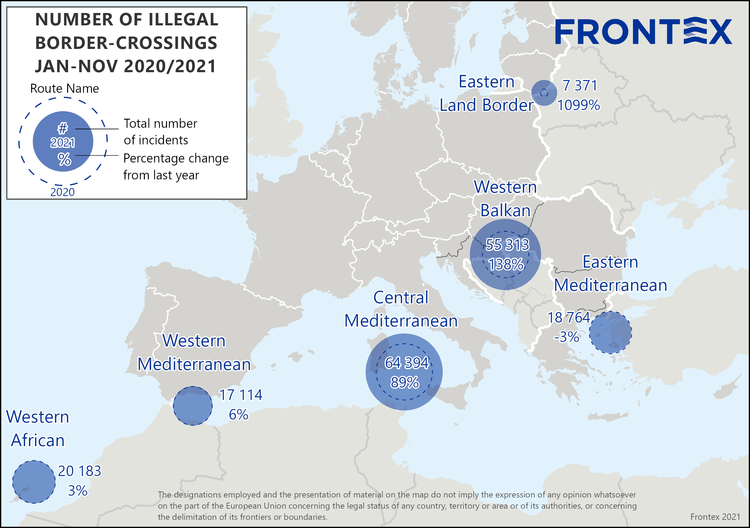The number of illegal border crossings at EU’s external borders in the first eleven months of 2021 rose to 184 180, an increase of 60% when compared to the previous year with COVID-19 restrictions. It is also 45% more than in 2019.
In November, there were about 22 450 detections of illegal border crossings on the main migratory routes into the European Union, nearly in line with 2020 and 35% more than two years ago.
While the
situation at the Eastern Border has started to de-escalate in November, it
remains tense.
Eastern Borders
On the EU’s Eastern borders, the number of
illegal border crossings this year reached almost 8000, thirteen times more
compared to 2020 and close to twelve times more than in 2019 in the same
period. The
main nationalities on this route in 2021 included citizens of Iraq,
Afghanistan, and Syria.
In November 2021, the situation at border has shown signs of de-escalatation but remained tense.
Western Balkan route
This year, there were about
55 310 detections of illegal border crossings into the EU via the Western
Balkan route. The figure is up 138% from the same period in 2020 and 387%
compared to 2019 (11 362).
As regards the migratory situation in November, about 7300 irregular migrants were detected on this route, 128% more than in November 2020. This is also 194% more than November 2019 (2 481).
Most migrants on this route came from
Syria, Afghanistan and Morocco.
Central Mediterranean route
In the first 11 months of
2021, there were about 64 400 illegal border crossings on the Central
Mediterranean route into the European Union, 89% more than in the previous year
and 380% more than in 2019.
In November alone, 8 337 detections were reported, 55% more than in 2020 and 492% more than in 2019.
The main nationalities on this route
included Tunisians, Egyptians and Bangladeshi.
Egyptians have become the second highest ranked nationality registered
in Italy in 2021, reportedly coming mainly from Libya. In addition, in
November, Egyptians were the main nationality registered in Italy.
Western Mediterranean route
While the situation on the Western
Mediterranean route remained stable in the analysed period, in November alone
the number of detections fell by 79% to 402. This is a decrease of 67% compared
to 2019.
In the first eleven months of 2021, 17 114
illegal border crossings were registered, 6% more than in 2020 and a decrease
of 24% compared to 2019.Nearly 63% of all migrants detected on this route were
Algerians, followed by Moroccans (30%).
Eastern Mediterranean route
Between January and November, 18 764
illegal border crossings were registered on the Eastern Mediterranean route, in
line with the same trend last year (down 3%). This was a drop of 75% compared
with the same period in 2019.
However, in November there were 2965 irregular border crossings on the Eastern Mediterranean route, an increase of 87% compared with November 2020.
The number of irregular migrants detected in Greece decreased by 13% when compared with November 2020 while Cyprus registered a surge in arrivals with a 244% increase compared with November 2020, accounting for 70% of the total arrivals on this route.
Most migrants on this route came from
Syria, Turkey and Congo (Kinshasa).
Western African route
This year,
the migratory pressure on the Western African route was comparable to the
situation in 2020. Between January and November, 20 183 illegal border
crossings were detected on this route, about 3% more than in 2020. This was
nevertheless an increase of 906% compared to 2019.
In November, 3353 irregular crossings were registered, down nearly 60% from a year ago but a 549% increase compared to November 2019
The majority of migrants on the Western African route came from sub-Saharan Africa.
